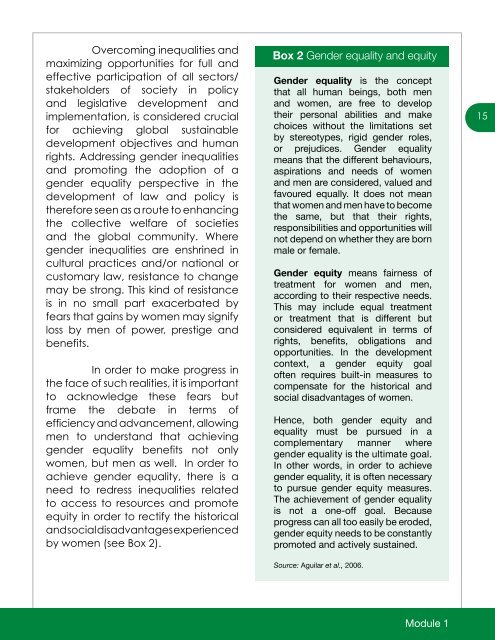GGCA Gender and Climate Change Training Manual - Women's ...
GGCA Gender and Climate Change Training Manual - Women's ...
GGCA Gender and Climate Change Training Manual - Women's ...
You also want an ePaper? Increase the reach of your titles
YUMPU automatically turns print PDFs into web optimized ePapers that Google loves.
Overcoming inequalities <strong>and</strong><br />
maximizing opportunities for full <strong>and</strong><br />
effective participation of all sectors/<br />
stakeholders of society in policy<br />
<strong>and</strong> legislative development <strong>and</strong><br />
implementation, is considered crucial<br />
for achieving global sustainable<br />
development objectives <strong>and</strong> human<br />
rights. Addressing gender inequalities<br />
<strong>and</strong> promoting the adoption of a<br />
gender equality perspective in the<br />
development of law <strong>and</strong> policy is<br />
therefore seen as a route to enhancing<br />
the collective welfare of societies<br />
<strong>and</strong> the global community. Where<br />
gender inequalities are enshrined in<br />
cultural practices <strong>and</strong>/or national or<br />
customary law, resistance to change<br />
may be strong. This kind of resistance<br />
is in no small part exacerbated by<br />
fears that gains by women may signify<br />
loss by men of power, prestige <strong>and</strong><br />
benefits.<br />
In order to make progress in<br />
the face of such realities, it is important<br />
to acknowledge these fears but<br />
frame the debate in terms of<br />
efficiency <strong>and</strong> advancement, allowing<br />
men to underst<strong>and</strong> that achieving<br />
gender equality benefits not only<br />
women, but men as well. In order to<br />
achieve gender equality, there is a<br />
need to redress inequalities related<br />
to access to resources <strong>and</strong> promote<br />
equity in order to rectify the historical<br />
<strong>and</strong> social disadvantages experienced<br />
by women (see Box 2).<br />
Box 2 <strong>Gender</strong> equality <strong>and</strong> equity<br />
<strong>Gender</strong> equality is the concept<br />
that all human beings, both men<br />
<strong>and</strong> women, are free to develop<br />
their personal abilities <strong>and</strong> make<br />
choices without the limitations set<br />
by stereotypes, rigid gender roles,<br />
or prejudices. <strong>Gender</strong> equality<br />
means that the different behaviours,<br />
aspirations <strong>and</strong> needs of women<br />
<strong>and</strong> men are considered, valued <strong>and</strong><br />
favoured equally. It does not mean<br />
that women <strong>and</strong> men have to become<br />
the same, but that their rights,<br />
responsibilities <strong>and</strong> opportunities will<br />
not depend on whether they are born<br />
male or female.<br />
<strong>Gender</strong> equity means fairness of<br />
treatment for women <strong>and</strong> men,<br />
according to their respective needs.<br />
This may include equal treatment<br />
or treatment that is different but<br />
considered equivalent in terms of<br />
rights, benefits, obligations <strong>and</strong><br />
opportunities. In the development<br />
context, a gender equity goal<br />
often requires built-in measures to<br />
compensate for the historical <strong>and</strong><br />
social disadvantages of women.<br />
Hence, both gender equity <strong>and</strong><br />
equality must be pursued in a<br />
complementary manner where<br />
gender equality is the ultimate goal.<br />
In other words, in order to achieve<br />
gender equality, it is often necessary<br />
to pursue gender equity measures.<br />
The achievement of gender equality<br />
is not a one-off goal. Because<br />
progress can all too easily be eroded,<br />
gender equity needs to be constantly<br />
promoted <strong>and</strong> actively sustained.<br />
Source: Aguilar et al., 2006.<br />
15<br />
Module 1

















